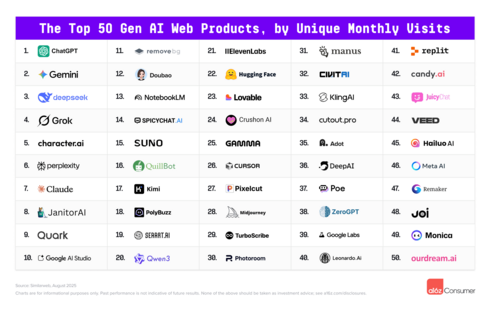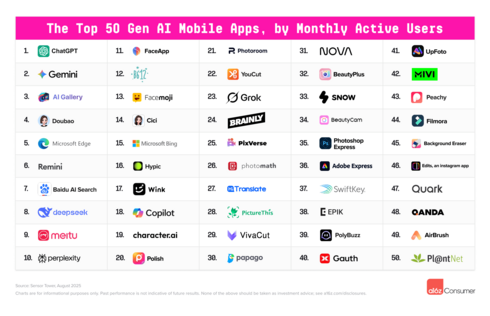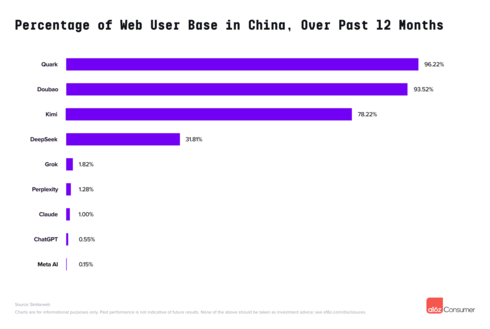
Global AI rankings: ChatGPT on top, Gemini and Perplexity catching up
Musk’s Grok skyrockets from zero to 20M users, while Chinese platforms flood the mobile charts.
OpenAI's ChatGPT remains the most widely used artificial intelligence tool, according to a new report by venture capital firm Andreessen Horowitz, which analyzed AI usage trends over the past two and a half years.
The report examined monthly visits to AI websites using SimilarWeb data and monthly active users in apps based on Sensor Tower data. ChatGPT leads by a wide margin in both categories. Gemini ranks second, with its website attracting only 12% of ChatGPT’s visits. On mobile, the gap narrows, Gemini has half the number of ChatGPT’s active users.
Gemini’s momentum is evident: monthly visits grew from 284 million in February to 700 million in July, though still far below ChatGPT’s 5.72 billion. Three other Google tools also made the top 50: AI Studio (10th), NotebookLM (13th), and Google Labs (39th).
On websites, China’s DeepSeek ranks third, followed by Elon Musk’s Grok. On mobile, Grok is 23rd, but its trajectory is striking: it had no app at the end of 2024 and now has 20 million active users. The July 4 launch of Grok triggered a 40% surge in xAI’s active user base.
Meta continues to lag, with only modest growth. Meta AI placed 46th on websites and failed to make the app rankings. By contrast, Perplexity is climbing rapidly: on mobile it jumped from 50th in March to 10th in July. On websites, both Claude and Perplexity posted gains, while DeepSeek lost ground, its mobile user base shrank 22% from peak levels, and its website traffic dropped 40% since February.
China climbs the ranks
Three China-focused platforms entered the global top 20, each deriving more than 75% of its traffic domestically: Alibaba’s Quark (9th on web, 47th on mobile), ByteDance’s Doubao (12th on web, 4th on mobile), and Moonshot AI’s Kimi (17th on web). Access to foreign AI tools such as ChatGPT, Claude, and Perplexity remains restricted in China, though some users still connect via VPNs or corporate networks.
China’s influence is especially strong on mobile, with 22 of the top 50 AI apps developed there (though only three primarily serve Chinese users). Chinese apps in photo and video stand out, benefiting from a deep bench of video researchers and more permissive copyright rules compared with the West.
Related articles:
AI coding assistants are also reshaping the rankings. In the previous report, Bolt was the only wave coding tool included (48th), but it has now fallen to 52nd. Two competitors have surged ahead: Lovable (23rd, up from 55th) and Replit (41st).



